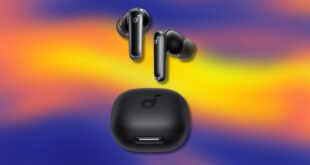In a trendy corner of Los Angeles, I got to try the new Mac Mini, iMac and MacBook Pro machines Apple just announced, which are powered by the company’s new M4 chips with Apple Intelligence AI.
These updated computers and laptops offer a range of improvements, some of which are minimal, like the MacBook Pro’s Thunderbolt 5 ports and the Mac Mini’s smaller size. But the the biggest advancement is the introduction of Apple-designed M4 chips in all models, which enable more AI features, capabilities and gaming performance. I saw some of these on display in Apple’s Los Angeles showcase, including demos with audio creation, video editing and gaming — and I came away impressed.
A few caveats: I wasn’t able to run any sort of benchmarks or test anything beyond what was available as part of Apple’s demos. Please stay tuned for our full reviews coming soon, which will show exactly how Apple’s lineup of M4 Mac Mini, iMac and MacBook Pro models stack up to their predecessors, and the growing competition of Microsoft’s AI-powered CoPilot Plus PCs.
M4 iMac colors are lovely but not too bright
Despite the surprisingly simple list of colors (Apple typically attaches some hyperbolic adjective to its hue names), the rainbow of M4 iMacs were too visually arresting to ignore. The M4 iMacs come in Blue, Purple, Pink, Orange, Yellow, Green, and Silver in a subtle two-tone scheme. The back of the computer has the bolder version of the hue, while the metallic stand and front panel below the display are slightly washed-out versions of the same color.
This makes them more attractive than ever, and they’re just as thin as last year’s iMac M3 models. What’s new are the Thunderbolt 4 ports (two on the cheaper configuration with two USB-C ports, or four on the pricier end), sharper 12-megapixel camera enabling Center Stage, and the optional nano-texture display which cuts down on glare — useful for office workers with lighting at unfortunate angles.
I saw the new Desktop Viewer, too, which shows what’s on your actual desk beneath the iMac’s display. While this felt gimmicky, it could conceivably be helpful for streamers working with their hands on crafts, or instructors writing math equations in longhand over Zoom, for instance.
An older Mac Mini (left) compared to the new M4-powered Mac Mini (right).
The adorably small but powerful Mac Mini
I’m a huge fan of small gadgets, so I found the new Mac Mini is as visually delightful as it is powerful. Just like with clamshell foldable phones, additional thickness is a worthwhile tradeoff if it means reducing the device’s overall footprint. Apple helpfully placed an older Mac Mini alongside the new one, and while the former is still impressively sized, the new Mini can be palmed in one hand. This is an M4-powered computer you could throw in a purse.
The bottoms of an older Mac Mini on the left and a new 2024 Mac Mini on the right — note the power button in the top right corner of its all-black bottom.
Yes, Apple has made another immediately infamous design choice in putting the power button on the bottom, but it’s easier to tilt the new Mini up to turn it on (if people switch their computers off anymore). The added USB-C 3 ports on the front are a nice addition for accessories that don’t need the 40 gigabits per second bandwidth of the three Thunderbolt 4 ports on the back. There’s a 3.5mm headphone jack in the front along with an HDMI and Ethernet port in the back — all your basics covered.
A bottom view of the new Mac Mini 2024, showing the power button’s placement: with the computer sitting on a desktop and the ports facing forward, the button is just under the rear-left corner.
One of the demos was run on a Mac Mini showing how it can run Logic audio editing software, within which the AI Music Maker can add AI-created music tracks to videos. These can be constructed piecemeal, adding layer by layer of drums, bass, keyboards and other musical elements — each of which can be tweaked with broad controls, no musical theory knowledge necessary.
The Logic computer program running AI Music Maker. Drums are on the top in yellow, while guitar and keyboard are below but not selected.
For instance, our demonstrator added kick drums and hi-hat cymbals just by tapping a few icons to add complexity to the track (in this case, more frequent and varied drums between the major beats). Melodic instruments can go up and down octave scales, while piano keyboards can select one or both “hands” to add high, low or both ranges of chord scales to audio. All of which is created by AI on the fly and usable royalty-free.
The MacBook Pro 2024 with M4 Max chip and 128GB of RAM playing the 2019 Remedy Entertainment game Control.
Macbook Pro is a Siri, ChatGPT and gaming machine
The new MacBook Pro models didn’t add anything to the layout or design over last year’s M3 models, though the lower-end M4 14-inch MacBook Pro now comes with three USB-C ports instead of two. In fact, all of this year’s models feature three Thunderbolt 5 ports for up to 120 gigabytes per second of data bandwidth.
On a maximum-specced MacBook Pro 16-inch model with an M4 Max chip and 128GB of RAM, I saw a demonstrator ask Siri AI to perform a few tasks, including offering advice on how to combine PDFs. Through Apple’s partnership with ChatGPT, I saw the AI chatbot answer a more complicated search asking for things to do in Malibu. The system took a couple of seconds to respond on both occasions, which was about the same time it took the iMac a few tables away to perform the same task. The laptops could also turn photos into AI-generated cartoons, which took around the same handful of seconds — somewhat similar to the image generator feature showcased on Microsoft CoPilot Plus PCs released earlier this year.
The most impressive feat I saw the M4 chips perform was pushing pixels to play Remedy Entertainment’s 2019 game Control. Apple chose a section of the third-person shooter set in dark, murky caves lit with bright flashes to show off the M4’s ray tracing capabilities. As I stomped through puddles of water to shoot enemies, I was able to see accurate reflections of my surroundings. Granted, this was running on a fully-specced Macbook Pro with M4 Max chip and 128GB of RAM, so I’m curious about how the more modest configurations handled such a graphical workload.
Overall, the Los Anglees demo session was a brief and controlled yet tantalizing peek at Apple’s new lineup of computers. Some will charm with their looks, others with their modest upgrades, but all promise the performance upgrades that enable AI capabilities. Though it’s worth noting that we won’t know how indispensable these tools are until Apple Intelligence rolls out and software companies integrate the next-generation tech.
Watch this: Apple’s New M4 Macs Up Close: 2024 MacBook Pro, Mac Mini, iMac Details
 meganwoolsey Home
meganwoolsey Home



